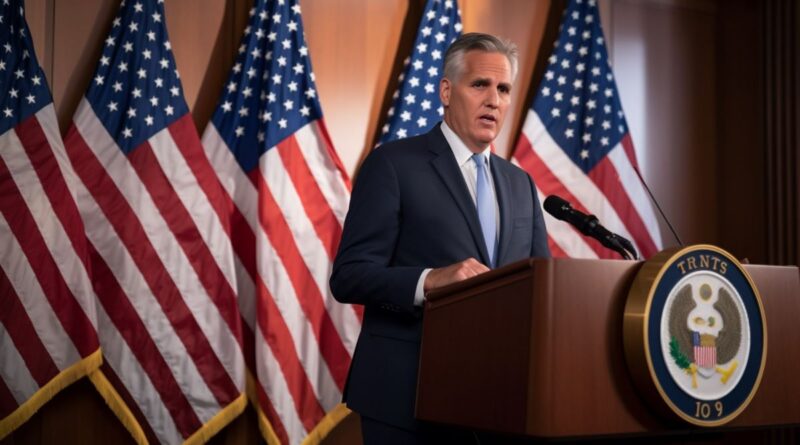
In a spectacle of unparalleled political disarray, House Republicans for the second time in a single week faltered in their attempt to initiate debate on a crucial military funding bill. The recent setback not only exposes the ongoing schisms within the Republican ranks but also raises alarms for a looming government shutdown.
This piece delves into the anatomy of the Republican dysfunction, its implications for the American legislative system, and what it reveals about the party’s leadership—or lack thereof. Republicans seem to be taking their marching orders from Trump, and others in the party who want to see the economy suffer in an attempt to hurt President Biden.
A Stunning Public Embarrassment
On the surface, the immediate causality appears straightforward: five conservative rebels obstructed the initiation of the bill due to their demands for additional spending cuts. This resulted in yet another public humiliation for House Speaker Kevin McCarthy and his caucus. However, such a facile analysis belies the intricacies of a party at odds with itself. Moderate Republicans decry their own party’s dysfunction as a “clown show,” warning that such antics could encourage pragmatists to work with Democrats, ultimately enabling the latter to keep the government funded.
The Incapability to “Count” Votes
In a scathing observation, Rep. Tim Burchett (R-Tenn.) alluded that GOP leaders “obviously can’t count” votes. The inability to rally party members around legislation is not just a momentary glitch; it reveals a lack of political acumen. In comparison, former Speaker Nancy Pelosi had an uncanny ability to keep her party in lockstep when it mattered. This raises the question: Is the current GOP leadership devoid of political stratagem?
The Promise that Never Was
Speaker McCarthy had declared that the House would labor through the weekend to resolve the crisis. This pronouncement proved hollow, as votes were canceled for Friday and the weekend, leaving members in limbo. If leaders are not held accountable for their public commitments, then the party risks perpetuating a cycle of ineffectiveness and mistrust among its members.
The Infighting Quagmire
Republican divisions are not merely superficial disagreements but indications of a broader ideological clash. For instance, the Republicans who voted ‘no’ included names from states as diverse as Georgia, North Carolina, Montana, and Arizona. Rules Committee Chairman Tom Cole (R-Okla.) later switched his vote to ‘no,’ a procedural move allowing for future re-evaluation. This makes one wonder: can a party so fractious effectively wield legislative power?
An Imminent Government Shutdown?
The lack of cohesion within the Republican Party portends ominously for the prospect of averting a government shutdown at the end of the month. The party has not only failed to initiate legislation but also lacks the capability to formulate policy compromises that could garner the President’s signature.
A Lost Opportunity to Address National Concerns
In a poignant critique, Rep. Mike Lawler (R-N.Y.) admonished his colleagues: “If they are unable or unwilling to govern, others will.” Indeed, in a climate where Democrats control the Senate and the White House, the Republicans must realize that obstructionism will not translate into political victories. They need to understand that genuine governance requires concessions and collaboration.
The Path Ahead: A Call for Renewed Leadership
The GOP’s recent blunders invite scrutiny of its leadership abilities and decision-making faculties. With members seemingly at cross-purposes, there is an urgent necessity for a visionary leadership that can not only unify the diverse factions within the party but also steer the legislative agenda in a way that resonates with the wider American populace.
The Republican Party stands at a pivotal juncture. It can either choose to remain mired in its self-inflicted woes or seize this moment as an opportunity for transformative change. And the clock is ticking. The question remains: Will the GOP rise to the occasion, or will history remember this period as a moment of abject failure for Republican governance?
